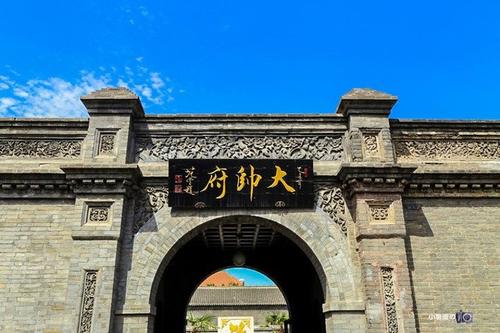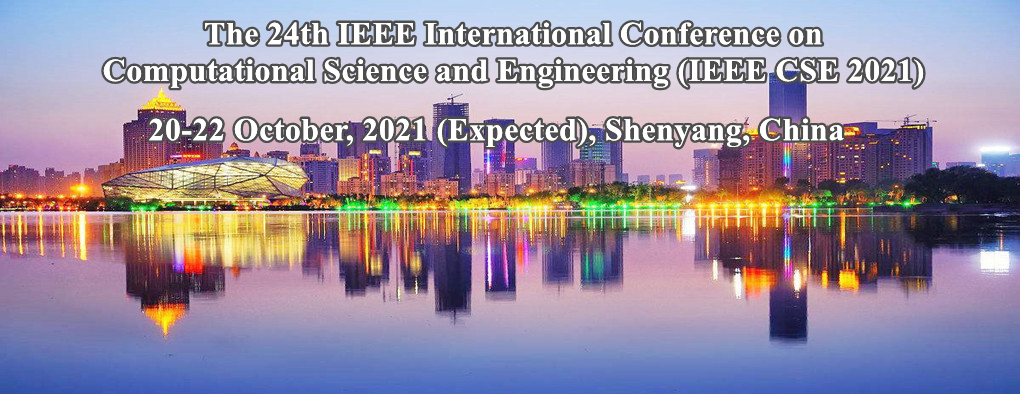
|
Landscapes |
|

Summer Palace Shenyang
|

Beiling
|
|

Commander Zhang's Mansion
|

Zhongjie
|

Shenyang Aerospace University
|
|
|
Introduction
The 24th IEEE International Conference on Computational Science and Engineering (CSE 2021) aims at bringing together researchers and practitioners in the world working on addressing these computing challenges on science and engineering, and providing a forum to present and discuss emerging ideas and trends in this highly challenging research field.
Important
Dates
| Workshop Proposal |
1 Feb. 2021 |
| Paper Submission Deadline: |
20 Mar. 2021 30 April 2021 (Firm) |
| Authors Notification: |
30 May 2021 7 June 2021 |
| Camera-Ready Submission: |
10 July 2021 |
| Early Registration Due: |
10 July 2021 |
| Conference Date: |
18-20 Aug. 2021 20-22 October, 2021 (Expected) |
Scope and Topics
Track 1: Big Data Applications and Analytics
- Novel Algorithms for Big Data
- Modeling and Simulation
- IoT Models and Applications
- Complex Big Data Applications in Science, Engineering, Medicine, Healthcare, Finance, Business, Law, Education, Transportation, Retailing, Telecommunication
- Big Data and Digital Transformation
- Big Data Analytics in Government, Public Sector and Digital Society
- Data and Information Quality for Big Data
- High-Performance Computing and Algorithms
- Databases and Data Mining Applications
- Energy-efficient Computing for Big Data
- Feature Selection and Feature Extraction
- Knowledge Discovery
- Mobility and Big Data
- Sequential Data Mining
- Social Network Mining
- Temporal and Spatial Data Mining
- Big Data Search Architectures, Scalability and Efficiency
- Text, Graph, Video, Multimedia Data Mining
Track 2: Intelligent and Bio-inspired Computing
- Artificial Intelligence and Machine Learning
- Artificial Immune Systems
- Business Intelligence and Multimedia Technology
- Computational Systems Biology and Medical Information
- Computational Neuroscience
- Complex Systems and Fuzzy Systems
- Evolutionary Computation
- Intelligent Computing in Biomedical Signal/Image Analysis/Computational Biology
- Natural Language Processing
Track 3: Computational Social Systems
- Fundamental Theories in SN/MSN
- Solutions to Key Problems in SN/MSN
- Typical SN/MSN Applications
- Socially-Inspired Design of Communications Networks
- Various Topics Related to SN/MSN Development Platform
- Privacy, Security, Ethics, Culture, and Anonymity Issues
- Social Sensing, Crowdsourced Sensing and Mobile Participatory Sensing
- u-Things, u-Science and u-Engineering
- Intelligent Transportation Systems, and Safety-Critical Systems
- Capacity Offloading through D2D Local Area Networks
- Economic, Social, Psychological Inspired Incentive Mechanisms
- Business Models of SN/MSN
Track 4: Scientific and Engineering Computing
- Model Fitting and Data Analysis
- Modeling and Simulation
- Numerical Simulations
- Algorithms for Solving Discrete and Continuous Problems
- Computational Optimisation
- Analysis and Visualization of Data
- Evolutionary Computing and Genetic Algorithms
- Fuzzy Systems
- Soft Computing
- High Performance Computing and Techniques to Gain Efficiency
Track 5: Cluster, Grid, P2P and Cloud Computing
- Autonomic Computing in P2P, Grid, Cloud systems
- Cloud Computing and Applications
- Data Intensive and Computing Intensive Applications
- Economics of P2P, Grid, Cloud and Internet Computing
- Grid and P2P Infrastructures for Data Storage and Data Mining
- High Performance and Scalable Computing
- Large-scale Collaborative Problem Solving Environments
- Programming models, tools, and environments
- Middleware for Grid, Cloud and P2P Systems and Applications
- Methodology and Practice of Semantic Grid and Web
- Overlay Networks for P2P Systems
- Reputation Aggregation for P2P, Grid, Cloud and Internet Computing Systems
- Scalability, Dependability and Reliability
- Scheduling, Resource Discovery and Allocation
- Social Networking and Implications
- Theoretical model for P2P, Grid, Cloud and Internet Computing Systems
- Trust Integration and Security
- Ubiquitous and Pervasive Computing Applications
- Virtual Organizations and Enterprise Computing
- Web and Grid Service-based Applications
Track 6: Mobile Computing and Wireless Communications
- Space-Time, MIMO and Adaptive Antennas
- Mobile Data Communication
- Security Issues Involved in Mobile Computing
- OFDM, CDMA and Spread Spectrum
- Multimedia in Mobile Computing: Issues, System Design, and Performance Evaluation
- Information Theory
- Multimedia Signal Processing
- Cross Layer Optimization in Wireless Networks
- Cognitive Radio, Ultra-wideband
- Multihop and Cooperative Communications
- Modulation, Coding, Diversity
- Signal Processing in Body Area Networks
- Wireless Emergency and Security Systems
Track 7: Embedded and Ubiquitous Computing
- Embedded System Software and Optimization
- Embedded System Architectures
- Hardware/Software Co-design and Design Automation
- Real-Time Systems and Operating Systems
- Application-Specific Processors and Devices
- Power-Aware Computing
- Sensor Networks
- System/Network-on-Chip
- Reconfigurable Computing Systems and Applications
- Pervasive Computing and Communications
- Middleware and Peer-to-Peer Computing
- Internet Computing and Applications
- Multimedia and Data Management
- Human-Computer Interaction
- Agents and Distributed Computing
- Security and Fault Tolerance Applications
Track 8: Security, Privacy and Trust
- Information and System Security
- Computer Security
- Reliable Computing
- Trusted Computing
- Network Security and Privacy
- E-Security
Track 9: Advanced Networking and Applications
- Communication Protocol and Architecture
- High-speed Communication and Network
- Wireless Communication and Network
- Mobile Ad-hoc and Sensor Network
- Low-Power Network and System
- Wearable Network and System
- Embedded System and Networking
- Internet Technology and IP-Based Applications
- Network Control and Management
- Network Performance, Analysis and Evaluation
- Quality of Services (QoS)
- Ubiquitous/Pervasive Networks and Computing
- Ubiquitous Intelligence and Smart World
- Smart Object, Space/Environment and System
- Innovative Networking and Applications
- Social, Ethical & Other Issues of Networked World
- Network and Application Hardware
Track 10: Service and Internet Computing
- Mathematical Foundation of Services Computing
- Services Science
- Service-Oriented Architecture (SOA)
- Web Services
- Wireless Grid and Communication Services Delivery Platform
- Grid Applications and System Solutions
- Dependable, Reliable and Autonomic Computing
Track 11: Distributed and Parallel Computing
- Parallel/Distributed Architectures
- Real-Time Parallel and Distributed Systems
- Parallel and Distributed Operating Systems and Middleware
- Parallel and Distributed Applications and Web Services
- Parallel I/O Systems and Storage Systems
- Tools and Environments for Parallel & Distributed Software Development
- Analysis and Design of Parallel and Distributed Algorithms
- Distributed Data and Knowledge Based Systems
- Distributed Graphics and VR/AR/MR System
- Distributed AI and Soft/Natural Computing
- Security in Parallel and Distributed Systems
Track 12: Dependable, Reliable and Autonomic Computing
- Autonomic Computing Theory, Models, Architectures and Communications
- Dependable Automatic Control Techniques and Systems
- Cloud Computing with Autonomic and Trusted Environment
- Reliable Computing
- Hardware and Software Reliability, Verification and Testing
- Dependability and Autonomic Issues in Ubiquitous Computing
- Software Engineering for Dependable Systems
Track 13: CSE Education
- Computer Aided Education
- Multimedia and Education
- Computer Science and Education Technology
- Computer and Education Training
- Computer and Education Management
- E-learning
- Knowledge Discovering
Paper
Submission Guideline
All papers need to be submitted electronically through the conference website (https://hpcn.exeter.ac.uk/cse2021/) with PDF format. Submitted papers must not substantially overlap with papers that have been published or that are simultaneously submitted to a journal or a conference with proceedings. A submission is limited to 8 pages for main conference regular papers, 6 pages for workshop papers or short papers in the IEEE Computer Society Proceedings Format with Portable Document Format (.pdf). A submission can have at most 4 additional pages with the pages overlength charge if accepted. Papers must be clearly presented in English, including tables, figures, references and appendices. Papers will be selected based on their originality, significance, relevance, and clarity of presentation assessed by at least three reviewers. Submission of a paper should be regarded as a commitment that, should the paper be accepted, at least one of the authors will register and present the work, with either online or offline presentation. IEEE CSE 2021 reserves the right to exclude a paper from distribution after the conference (e.g., removal from the digital library and indexing services), if the paper is not presented at the conference. Accepted and presented papers will be submitted in the IEEE for indexing. Distinguished papers presented at the conference, after further revision, will be published in special issues of high quality international journals.Two or three outstanding papers will be selected to receive the Best Paper Awards.
|
Important Dates
Workshop Proposal:
1 Feb. 2021
Paper Submission Deadline:
20 Mar. 2021
30 April 2021 (Firm)
Authors Notification:
30 May 2021
7 June 2021
Camera-Ready Submission:
10 July 2021
Early Registration Due:
10 July 2021
Conference Date:
18-20 Aug. 2021
20-22 October, 2021 (Expected)
支持单位
沈阳市科学技术协会 |

